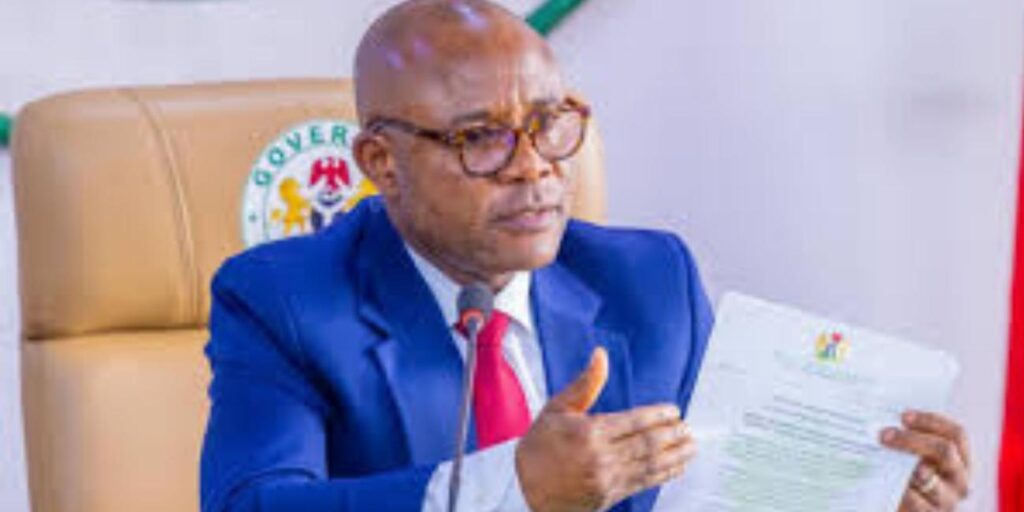
Governor Peter Mbah of Enugu State has reiterated that the release of detained Indigenous People of Biafra (IPOB) leader, Mazi Nnamdi Kanu, can only be achieved through political dialogue rather than legal confrontation.
Speaking during a state-wide broadcast on Tuesday — shortly after announcing his defection from the Peoples Democratic Party (PDP) to the All Progressives Congress (APC) — Governor Mbah maintained that his position on the matter has remained consistent since assuming office in 2023.
“It took barely a week after I assumed office that I had a meeting with the President, and I was very specific when I came out to address the press that I also raised the issue of Nnamdi Kanu with the President,” Mbah said.
The governor emphasized that a political solution remains the most viable and sustainable path toward ending the prolonged detention of the IPOB leader.
“I strongly believe that the Nnamdi Kanu problem is going to be solved politically. With this now, I think it is also an opportunity for the South-East to consolidate our position and make a very strong case for this to be resolved politically,” he added.
Governor Mbah called on South-East leaders and stakeholders to unite behind a shared position and pursue a collective political strategy in their engagement with the federal government.
“First of all, we need to accept the concept that this is the right thing to do. Then, the details of implementation will be worked out because there will certainly be details. It’s not something you can possibly outline now, but it’s for us to even accept the concept that this is the way to move forward,” he explained.
Mbah’s comments come amid renewed agitation for Kanu’s release and increasing calls for the federal government to adopt a political, rather than punitive, approach to addressing the IPOB issue.
Kanu has remained in the custody of the Department of State Services (DSS) since his re-arrest in Kenya and extraordinary rendition to Nigeria in June 2021. Despite several court orders granting him bail, his continued detention has fueled widespread criticism both within and outside Nigeria.
The IPOB leader is currently facing a seven-count charge bordering on terrorism and related offences.
Governor Mbah had earlier, in August, used the platform of the Nigerian Bar Association (NBA) Annual General Conference in Enugu to call for Kanu’s release, describing his detention as “unjust” and urging the federal government to “do the right thing.”
“My first visit to the President was about Nnamdi Kanu. I believe that the right thing to do is to release him. Hopefully, that will be done soon,” the governor had said at the time.
Meanwhile, human rights activist Omoyele Sowore has intensified mobilisation for the planned October 20 #FreeNnamdiKanu protest march to the Presidential Villa, Abuja, demanding the immediate and unconditional release of the detained separatist leader.
Sowore, who announced the march via his X (formerly Twitter) handle, said the protest would be a peaceful and lawful demonstration aimed at ending Kanu’s “political persecution.”
“We now have a date for the historic #FreeNnamdiKanuNow protest march to the Aso Rock Villa in Abuja. It is October 20 at 7 am,” Sowore posted.
He challenged political leaders and influential figures from the South-East — including Governor Chukwuma Soludo (Anambra), Senator Enyinnaya Abaribe, Governor Alex Otti (Abia), and Peter Obi, the 2023 Labour Party presidential candidate — to join him in person rather than offer verbal support from afar.
“No more empty noise. Let Governor Soludo, Senator Abaribe, Alex Otti, Peter Obi, and all others who claim to care step up and join us in person,” he wrote.
The activist’s renewed campaign has gained growing traction, with support from Abia State lawmakers, former Vice President Atiku Abubakar, MASSOB founder Chief Ralph Uwazuruike, and Kanu’s counsel, Barrister Aloy Ejimakor.
As political realignments continue across Nigeria’s South-East, Governor Mbah’s defection to the APC — and his renewed call for a political resolution to Kanu’s case — may signal a fresh chapter in the region’s engagement with the federal government over the contentious issue.